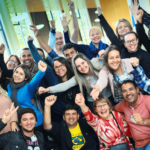
Miriam Kyule, Eija Laitinen & Satu Määttänen
Education is the key to societal development and a sustainable future. To fulfil their multifaceted roles as development and change agents, information and innovation providers, and producers of human capital and skilled workforce (Watson et al., 2011, pp. 24, 25), higher education institutions (HEIs) need to adapt and change in parallel to the changing world and demands of world of work.
Two educational approaches have gained attention as possible solutions to adjust the educational delivery to the 21st-century needs: competency-based learning and digitalisation of teaching and learning.
Competency-based learning refers to a pedagogical approach that aims to develop, and subsequently evaluate, a wide range of student competencies needed in real life (Henri et al., 2017). The competencies can be knowledge, skills, attitudes and values, as defined in the OECD (2019) Learning Compass 2030. Student-centered learning is a key component of competency-based learning and competency-based curricula. Student-centered learning emphasises students’ role in learning. It gives students the power to influence their learning and urges them to take responsibility for their learning (Weimer, 2002, pp. 28, 95).
Digitalised teaching and learning, also referred to as e-learning, has been a major topic among educators, especially during and after the Covid-19 pandemic that forced digitalised learning to almost every educational institution. E-learning has huge potential to reach wide numbers of learners with minimal costs, and due to its flexibility, accommodate learning to various individual situations and societal settings. Digitalising learning can be one pathway in achieving the United Nation’s Sustainable Development Goal of Quality Education.
In this article, we reflect our experiences and thoughts of competency-based education, and digitalised teaching and learning in the African setting, with a future-oriented focus. The article is inspired by the fruitful discussions and sessions of The Regional Universities Forum for Capacity Building in Agriculture (RUFORUM) Annual General Meeting in 2022, and it is based on our broad experience within the African educational setting.
Competency-based learning
The importance of competency-based learning and the development of students’ 21st -century skills are well recognized in the higher education setting in Africa. However, it remains unclear how well it is understood that to achieve these, a paradigm change is needed in education delivery (Ojok et al., 2022). Development of student competencies and adopting student-centered learning are well embraced in talks, but how they do or will exist in practical teaching and learning is still ambiguous.
One approach to deliver 21st-century competencies to students is through problem-based learning (PBL) (Tan et al., 2014) and community exchange. In this pedagogical approach, students learn through exposure to real-life challenges, often faced by society, that the students aim to solve within teams (Määttänen et al., 2022). Yet, how many universities in Africa at this day have experience in incorporating student work and courses with collaboration with actors outside the academia is another question. For some educational designers, the concept of real-life, student-community collaboration may be rather new.
Strong demands are often voiced to university teachers to change their teaching practices, with responsibility pushed to individual teachers. Yet, this is not a sustainable approach. System-level change is needed, and it cannot happen through individuals at the operational level, but management-level intervention and support are critical.
Most of the teaching staff in African HEIs do not have a pedagogical background. Hence their teaching is informed by their own experience, leading to the continuous use of traditional teacher-centered approaches – mainly lecturing. To develop teacher competencies and to enable adoption of new, modern teaching approaches, continuous professional teacher development is required (Harrison et al., 2022).
African governments are justly promoting increased access to education, but this is not reflected in the universities’ budgets. Many African universities struggle with an increased number of students combined with a lack of adequate resources. Resource-constrained learning environment hampers the provision of practical learning experiences, such as PBL (Getuno et al., 2022).
Critical questions to be answered include:
- What pedagogical strategies have universities put in place to deliver 21st -century skills?
- What are universities practically doing to deliver 21st -century competencies for their graduates?
- What actions are taken to avail pedagogical training to staff members?
- How, and by whom, the resources needed to upgrade teaching are secured and distributed?
Digitalisation of teaching and learning
In recent years, digital learning has been strongly on the agenda of RUFORUM and African HEIs (RUFORUM, 2021, 2022). Generally, some universities are very advanced in digitalising teaching and learning, while others have hardly started, or possibly are only forced to do this by the COVID-19 pandemic.
E-learning in Africa faces challenges that need to be solved to enable quality learning experiences in the digital setting.
Lack of availability and access to the internet and technology are serious issues in many African HEIs. The technology used in campuses may be outdated, slowing down the connection and causing compatibility issues with different software. Networks and the internet are often unreliable, and the cost of buying internet bundles can be too much for a student’s budget. Despite the strong push towards digital teaching and learning, the discussion and practical solutions on how to overcome the critical issues of availability and access are still in their infancy.
Even less attention seems to be given to the issue of how to teach and structure learning content in a digital setting. Quality in online teaching, especially inspiring and motivating learners, is often much more challenging to achieve than in contact teaching. At its worse, e-learning is organised as sharing recorded lectures and documents in online learning platforms. We wonder if the magnitude of challenges related to the pedagogical competencies in digital teaching is acknowledged and understood in the higher levels pushing down the digitalisation. Whatever the case, it is clear that teachers transforming to digitalized teaching and learning need support and adequate training.
To enable efficient and professional use of different digital tools, the ICT skills of both staff and students need updating. University staff need capacity building on how to use online tools for interactive and participatory learning. To smoothen the transformation towards e-learning, commonly used and familiar online tools can be utilised, such as smartphones, and low-data usage applications, such as Facebook and WhatsApp.
The most important question remains, what is the impact of e-learning on learning outcomes? Encouraging success stories on online teaching in African universities were reported during the RUFORUM meeting, but the critical aspect of learning outcomes in online teaching and learning was ignored. It may be that the discussion is not yet on this level, as universities are mostly still struggling with the fundamental issues of digitalising teaching and learning. However, this is a critical issue that must be brought to the table.
Conclusion
The educational actors in Africa have established ambitious and necessary aims for the educational sector to respond to the 21st -century needs. Competency-based education and digitalised teaching and learning are among the targets. Raising discussions and defining goals is the first, and very important, step. The next step is to put the strategies into practice and incorporate competency-based learning and digitalisation into curricula delivery. Achieving this is not an easy task. In this article, we have presented our insights and posed questions that we believe can give guidance on how, in practical terms, solutions can be found to enable this educational paradigm shift. The article is based on the African setting, but the insights can be applied also in other parts of the world.
Authors
Miriam Kyule, Ph.D. in Agricultural Education, Researcher and Lecturer in Curriculum Development, Pedagogy, Measurement and Evaluation at Egerton University, Kenya.
Eija Laitinen, Ph.D. in Adult Education, Principal Research Scientist in HAMK Bio Research Unit. She is AgriSCALE and PBL-BioAfrica Project Coordinator and leads the HAMK Africa Team.
Satu Määttänen, M.Sc. in Agricultural Sciences and M.Sc. in Environmental Science and Policy from the University of Helsinki. She works as a Research Assistant at Häme University of Applied Sciences in Bio Research Unit.
References
Getuno, D. M., Misango, S., Phiri, M., Aoyo, C., Namodi, M. O., Määttänen, S., & Laitinen, E. (2022). Challenges of using problem-based learning in Africa’s higher education institutes and the way forward. In E. Laitinen, S. Määttänen, & U.-M. Knuutti (Eds.), Problem-based learning & agropreneurship in Africa. HAMK Unlimited Professional. https://urn.fi/URN:NBN:fi-fe2022061546622
Harrison, S., Yengwe, Jo., Mwelwa-Zgambo, L., Kasivu, G., Mwania, J. M., Kiggundu, J., Ngamau, C., Obegi, F., Loyolah, R., Määttänen, S., & Laitinen, E. (2022). The challenges and needs of professional teacher training. In E. Laitinen, S. Määttänen, & U.-M. Knuutti (Eds.), Problem-based learning & agropreneurship in Africa. HAMK Unlimited Professional. https://urn.fi/URN:NBN:fi-fe2022101161556
Henri, M., Johnson, M. D., & Nepal, B. (2017). A Review of Competency-Based Learning: Tools, Assessments, and Recommendations. Journal of Engineering Education, 106(4), 607–638. https://doi.org/10.1002/JEE.20180
Määttänen, S., Knuutti, U.-M., & Laitinen, E. (2022). Piloting international student challenges: results on students’ perspective. HAMK Unlimited Professional, 26.9.2022. https://urn.fi/URN:NBN:fi-fe2022062047869
OECD. (2019). Transformative Competencies for 2030. Concept note. https://www.oecd.org/education/2030-project/teaching-and-learning/learning/transformative-competencies/Transformative_Competencies_for_2030_concept_note.pdf
Ojok, K., Kimatu, J. N., Mutambi, J., Okidi, L., Ruhiu, S., Määttänen, S., & Laitinen, E. (2022). The need for an educational paradigm shift in sub-Saharan Africa. In E. Laitinen, S. Määttänen, & U.-M. Knuutti (Eds.), Problem-based learning & agropreneurship in Africa. HAMK Unlimited Professional. https://urn.fi/URN:NBN:fi-fe2022120970258
RUFORUM. (2021). The Seventh African Higher Education Week and RUFORUM Triennial Conference 2021: Summary Conference Report. https://www.ruforum.org/Triennial2021/sites/default/files/Summary%20Narrative%20Report-2021%20Triennial%20Conference.pdf
RUFORUM. (2022). RUFORUM Annual General Meeting. Theme: Strengthening Africa’s Agri-food Systems in the Post COVID-19 Era – Opportunities and Challenges. https://www.ruforum.org/AGM2022/sites/default/files/RUFORUM%20AGM%202022%20AGM%20Higlights.pdf
Tan, D. K., Koppi, A., & Field, D. J. (2014). The student perspective in developing graduate attributes through problem-based learning in first year agricultural science. Proceedings of The Australian Conference on Science and Mathematics Education, 170–175. https://openjournals.library.sydney.edu.au/index.php/IISME/article/view/7784
Watson, D., Hollister, R., Stroud, S., & Babcok, E. (2011). The engaged university : international perspectives on civic engagement (1st ed.). Routledge.
Weimer, M. (2002). Learner-centered teaching: five key changes to practice (1st ed.). Jossey-Bass.





